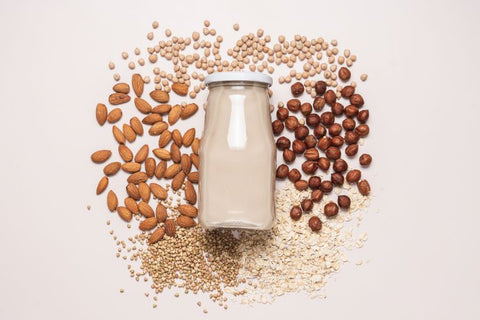Ever wondered how much casein protein you should consume before bed to support your muscle recovery and growth overnight? In this quick guide, we'll explore the optimal amount of casein, its benefits, and considerations for incorporating it into your bedtime routine. Whether you're aiming to enhance muscle repair, manage weight, or simply improve your overall dietary balance, understanding the role of casein before bed is essential.
Let's delve into the benefits of casein protein consumption before bedtime, addressing questions such as timing, protein content, digestive comfort, and the importance of consulting professionals for personalized advice.
Slow Digestion Rate
Our bodies rely on protein for a multitude of functions, from building muscle to fueling enzymes. Casein, a major protein found in milk, stands out for its unique digestion process. Unlike some proteins that are quickly broken down and absorbed, casein takes its time. Let's explore the fascinating reasons behind casein's slow digestion rate and how its structure plays a key role in this delayed release of amino acids.
Micellar Structure: Casein naturally forms tiny spheres called micelles. These micelles act like a protective shell, encapsulating casein proteins and slowing down their breakdown by digestive enzymes.
Casein Network: Within the stomach, casein interacts with other milk proteins and calcium to form a gel-like network. This network further hinders the access of digestive enzymes to casein molecules, delaying their digestion and absorption.
Multiple Casein Types: Different types of casein have slightly varying digestion rates. Beta-casein, the most abundant casein type in cow's milk, digests slower compared to alpha-casein.
pH Dependence: Casein is more resistant to breakdown in acidic environments like the stomach. As food moves into the small intestine with a more alkaline pH, casein gradually unfolds and becomes susceptible to enzyme action.
Muscle Repair and Growth
Casein's slow and steady digestion makes it a valuable protein for muscle repair and growth, particularly during sleep. Here's how it works:
Slow Release of Amino Acids: Unlike fast-digesting proteins like whey, casein provides a sustained release of amino acids into the bloodstream over several hours. This prolonged supply ensures your muscles have a constant stream of building blocks for repair and growth throughout the night.
Muscle Protein Synthesis: During sleep, your body enters a state where muscle breakdown can occur. The steady flow of amino acids from casein helps counteract this breakdown and stimulates muscle protein synthesis (MPS), the process by which your body builds and repairs muscle tissue.
Anti-Catabolic Effect: Casein's slow digestion also has an anti-catabolic effect, meaning it helps prevent the breakdown of muscle tissue for energy. This is especially beneficial during sleep when you're not actively consuming protein.
Nighttime Advantage: Since you're not typically consuming protein while you sleep, casein's sustained release provides a valuable source of amino acids during this extended period of muscle vulnerability. This can be particularly advantageous for athletes or individuals focused on muscle building.
Optimal Timing
The optimal timing for consuming casein to support overnight muscle recovery depends on a few factors, but generally, it's recommended to take it 30-60 minutes before bed. Here's a breakdown:
Target Window:
- Nighttime Support: We want the casein to provide a sustained release of amino acids throughout the night. Consuming it close to bedtime ensures this window aligns with your sleep schedule.
Digestion Considerations:
- Slower Digestion: Casein takes longer to digest than other proteins. Allowing sometime before bed prevents discomfort from a full stomach while sleeping.
Individual Needs:
- Sensitivity: If you have any sensitivity to dairy or casein, consider taking it slightly earlier (around 1 hour before bed) to allow for some digestion before sleep.
Overall, the 30-60 minute window before bed offers a good balance between ensuring casein digestion starts before sleep and allowing enough time for some initial breakdown to avoid sleep discomfort.
Protein Content
The optimal amount of casein protein to consume before bed depends on several factors, and there's no single one-size-fits-all answer. Here's a breakdown to guide you:
Recommended Range:
- Generally: Studies suggest a range of 30-40 grams of casein protein before bed can be effective for promoting muscle repair and growth during sleep.
Individual Factors Influencing Amount:
- Body Size and Muscle Mass: Larger individuals with more muscle mass might require slightly higher casein intake compared to smaller individuals.
- Activity Level: Highly active individuals or athletes focused on muscle building might benefit from the upper end of the recommended range (30-40 grams).
- Overall Protein Intake: Consider your total daily protein intake. Casein before bed should complement, not replace, protein consumed throughout the day.
Individual Protein Requirements
Casein can indeed offer additional benefits when combined with other nutrients, particularly carbohydrates. Here's how pairing casein with carbohydrates can enhance its effects on muscle protein synthesis (MPS):
Benefits of Combining Casein with Other Nutrients:
- Complementary Effects: Different nutrients play different roles. Combining casein (a protein) with carbohydrates and healthy fats can create a more balanced pre-or post-workout meal or snack, potentially supporting various recovery processes.
- Carbohydrates and Insulin: Carbs stimulate insulin release. While excessive insulin can blunt MPS in some situations, a moderate amount during recovery can help drive amino acids (from casein) toward muscle tissue for repair and growth.
How Carbohydrates Enhance Casein's MPS Effects:
- Insulin Signaling: When you consume carbohydrates, your blood sugar levels rise, triggering the pancreas to release insulin. Insulin acts like a key, unlocking muscle cells and allowing amino acids (from casein) to enter more readily. This increased uptake of amino acids provides the building blocks for MPS.
- Glycogen Replenishment: During exercise, your muscles use glycogen (stored carbohydrates) for energy. Consuming carbohydrates alongside casein helps replenish glycogen stores, which can be especially beneficial for athletes or individuals engaging in intense training.
- Blunting Muscle Breakdown: Carbohydrates can also help suppress the release of stress hormones like cortisol, which can contribute to muscle breakdown. This creates a more favorable environment for muscle repair and growth.
Choosing the Right Carbs:
- Timing: The ideal timing for carbohydrate intake depends on your goals. For promoting overnight muscle recovery, complex carbs with a moderate glycemic index (GI) might be suitable, as they provide sustained energy release.
- Types: Examples of complex carbs with a moderate GI include whole grains, sweet potatoes, fruits, and some vegetables.
Weight Management Considerations
The potential benefits of casein for weight management are a subject of ongoing research, and the results are mixed. Here's a breakdown of what we know about casein and its impact on fullness and calorie control:
Potential Benefits of Casein for Weight Management:
- Slow Digestion and Satiety: Casein's slow and steady digestion rate can promote feelings of fullness for a longer duration compared to faster-digesting proteins. This feeling of satiety might help reduce overall calorie intake throughout the day.
- Reduced Cravings: By keeping you feeling fuller for longer, casein might help curb cravings for sugary or unhealthy snacks, potentially leading to better calorie control.
Limited Evidence and Individual Variations:
- Studies investigating casein and weight loss have yielded mixed results. While some suggest potential benefits, others haven't found a significant effect.
- Individual factors like genetics, gut health, and overall diet likely play a role in how casein impacts satiety and calorie intake.
Casein and Feelings of Fullness:
- Hormones: Casein might influence the release of hormones like peptide YY (PYY) and glucagon-like peptide-1 (GLP-1), which can promote feelings of fullness and satiety.
- Slower Stomach Emptying: Casein's interaction with other stomach contents can lead to slower stomach emptying, potentially contributing to a prolonged feeling of fullness.
Balanced Diet
While casein offers some potential benefits, particularly for muscle repair and recovery during sleep, it's crucial to maintain a balanced diet even when incorporating it before bed. Here's why:
- Macronutrients: Casein, being a protein, primarily provides amino acids. A balanced diet ensures you consume adequate amounts of other essential macronutrients like carbohydrates for energy and healthy fats for satiety and hormone balance.
- Micronutrients: Casein offers limited micronutrients like vitamins and minerals. A balanced diet rich in fruits, vegetables, and whole grains provides a wider range of these vital micronutrients for overall health.
- Nutrient Interactions: Different nutrients work together synergistically. For example, some vitamins and minerals aid in protein metabolism, potentially enhancing the benefits of casein.
- Overall Well-being: A balanced diet promotes not just muscle health but also supports various bodily functions like immune system function, digestion, and energy levels. Casein alone cannot provide all the necessary components for optimal health.
- Sustainability: A balanced diet is more sustainable in the long run. Relying solely on casein before bed might not be practical or enjoyable in the long term.
- Variety: A balanced diet promotes dietary variety, which is essential for ensuring you consume a broad spectrum of beneficial nutrients.
How to Achieve Dietary Balance with Casein
Here's how you can achieve dietary balance while incorporating casein:
- Protein Planning: Factor in casein intake with other protein sources throughout the day to meet your overall protein needs.
- Focus on Whole Foods: Build your diet around fruits, vegetables, whole grains, and lean protein sources beyond casein.
- Healthy Fats: Include healthy fats like avocado, nuts, and seeds for satiety and hormone balance.
- Portion Control: Be mindful of portion sizes, even with casein, to avoid exceeding your calorie needs.
While casein can be a valuable addition to your diet, there are situations where consulting a professional is a wise move. If you experience digestive discomfort after consuming casein, it might be a sign of a sensitivity or allergy, and a healthcare professional can help you get a diagnosis and find alternative protein sources if needed.
Underlying digestive conditions like IBS or Crohn's disease can also be impacted by casein intake, so discussing this with your doctor can help you navigate potential interactions and dietary adjustments.
Even if you're simply unsure about casein intake or want personalized advice for your goals, a registered dietitian can be a great resource. They can guide you on portion sizes, potential medication interactions, and how to best incorporate casein into a balanced diet that aligns with your specific needs. Remember, consulting a professional is always recommended if you have any concerns or uncertainties about casein consumption about your health and goals.
Key Takeaways
- Casein protein digests slowly, providing a steady release of amino acids.
- Consuming casein before bed supports muscle repair and prevents breakdown during sleep.
- Take casein 30-60 minutes before bedtime for optimal digestion.
- Aim for 30-40 grams of casein before bed, considering individual factors.
- Pairing casein with carbohydrates enhances muscle protein synthesis.
- Casein promotes fullness, aiding in calorie control.
- Start with smaller amounts and pay attention to timing for comfort.
- Incorporate casein into a balanced diet for overall health.
- Consult healthcare professionals for personalized advice.
- Adjust casein intake based on individual needs and preferences.






